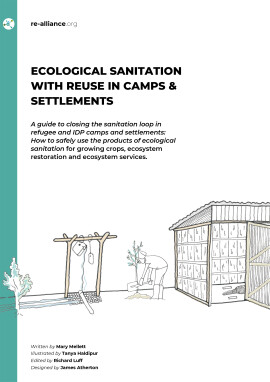
Sanitation in Humanitarian Settings
In an emergency the collection, treatment and disposal/reuse of human waste is critical to the health, wellbeing and environment of affected populations. Addressing this is difficult and complex requiring an understanding of the technical, social, institutional, political and environmental issues affecting the situation. In large emergencies where international relief agencies are involved there usually will be specialists available to advise and assist inexperienced field staff deliver essential services. However, most emergencies are not large. They are local in nature and rely on local officials to provide an emergency response, especially in the early stages of the emergency. It is very likely that these officials will have minimal knowledge and experience of emergency response, indeed they have probably never been faced with such an event before.
This book sets out to assist such individuals. Working from a technical perspective, it provides an understanding of the critical elements controlling the delivery of human waste related services, together with strategies for decision making and guidance on how to design, construct and operate key infrastructure. The book concentrates on the acute response and stabilization phases of an emergency – but much of the content is equally relevant to the long term and rehabilitation phases.
Donate and support this book project and we will send copies of this book to communities in need of this important guide.
Published: 2024
Pages: 392
eBook: 9781788532679
Paperback: 9781788532655
Hardback: 9781788532662
This book sets out to assist such individuals. Working from a technical perspective, it provides an understanding of the critical elements controlling the delivery of human waste related services, together with strategies for decision making and guidance on how to design, construct and operate key infrastructure. The book concentrates on the acute response and stabilization phases of an emergency – but much of the content is equally relevant to the long term and rehabilitation phases.
Donate and support this book project and we will send copies of this book to communities in need of this important guide.
| 1 Introduction | |||
|---|---|---|---|
| 2 Priorities and Objectives | |||
| 3 Non-technical issues affecting service delivery and sustainability | |||
| 4 Core technical design parameters for faecal sludge management | |||
| 5 The toilet and environment | |||
| 6 Onsite FS collection, storage and treatment | |||
| 7 Toilet emptying | |||
| 8 Faecal sludge transport | |||
| 9 Emergency treatment | |||
| 10 Tertiary treatment, disposal, and re-use | |||
| 11 FSM in very cold climates | |||
| 12 FSM during health epidemics | |||
| 13 Technology selection | |||
| 14 Emergency Sullage/grey water disposal | |||
| 15 Emergency solid waste management |
'Sanitation in Humanitarian Settings by Robert Reed makes an important contribution to sector knowledge on the topic. Where other guidance focuses primarily on containment, this guide covers the entire sanitation chain and addresses faecal sludge management in detail from both technical and non-technical perspectives. It also provides practical guidance on the related, but too often neglected, issues of sullage and solid waste management, making this an invaluable addition to the humanitarian worker’s toolkit.'
Dr. Peter Harvey, United Nations Children’s Fund (UNICEF)
'Sanitation in Humanitarian Settings captures in one place the recent thinking in emergency sanitation. While there is a focus on emergency excreta disposal and treatment, much of the appeal of this book is the attention given to the other aspects of sanitation such as faecal sludge management in disease outbreaks, grey water disposal, solid waste and recycling. It is a must read for any practitioners in emergency sanitation.'
Andy Bastable, Head of Water and Sanitation, Oxfam Global Humanitarian Team
'In humanitarian contexts, the importance and life-saving nature of effective sanitation and faecal sludge management cannot be overstated. This long-awaited book combines decades of practical experiences from various contexts with the latest global sector knowledge and provides structured and detailed guidance on the most crucial technical and non-technical aspects of a sanitation response. I highly recommend it to be used as a constant companion for all those – voluntarily or involuntarily – confronted with planning and implementing humanitarian sanitation interventions.'
Rob Gensch, German Toilet Organization
'In the face of unforeseen circumstances, having access to a reliable and comprehensive guide to emergency sanitation is crucial for ensuring the health and safety of individuals and communities. Sanitation in Humanitarian Settings is an invaluable resource that provides readers with a clear understanding of essential full sanitation practices during emergencies. The author's expertise shines through in the ability to distil complex concepts into easy-to-follow guidance, making this book accessible to a wide audience in every aspect of sanitation in emergency situations. Whether navigating natural disasters or humanitarian crises, this emergency sanitation book is indispensable for anyone seeking to maintain a healthy and hygienic environment. Its comprehensive coverage, practical approach, and user-friendly format make it an essential addition to any emergency preparedness kit.'
Debora Bonucci, WASH Adviser at the British Red Cross
R.A Reed
Robert (Bob) Reed has been involved in water supply and sanitation for low-income communities and emergencies for 40 years. He has worked in many countries, mainly in Africa and Asia but for over 30 years he was based at Loughborough University working in a group called WEDC where he taught, consulted and undertook research related to low-cost water supply and sanitation.






